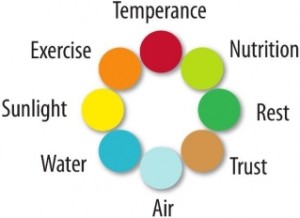(This is the sixteenth in a series of health articles that  are designed to help you gain a deeper appreciation for God’s amazing handiwork of the human body and a better understanding of how it works and how it can be better maintained by simple methods. George McDaniel is my father-in-law, and has been a registered nurse for many years, which, along with much research, has taught him many useful health principles. I pray that you are being blessed by these articles. Editor)
are designed to help you gain a deeper appreciation for God’s amazing handiwork of the human body and a better understanding of how it works and how it can be better maintained by simple methods. George McDaniel is my father-in-law, and has been a registered nurse for many years, which, along with much research, has taught him many useful health principles. I pray that you are being blessed by these articles. Editor)
Temperance
For those who have not read the previous articles, I will explain the method of selection of topics. It has been said that there are eight natural remedies that can be used to heal the body of disease and to maintain it in a healthy condition. Someone came up with a mnemonic (memory device) for remembering them. This is: NEW START. This stands for nutrition, exercise, water, sunlight, temperance, air, rest and trust in God. The first four have been covered. Therefore, the topic for this issue is temperance.
Many people think temperance means not drinking alcoholic beverages. It has a much broader meaning than this. The word itself means moderation or restraint. True temperance can be described as avoiding everything harmful and using moderately those things that are good. We live in a very intemperate age. The motto of many people seems to be, “If it feels good, do it; if it tastes good, eat it.” Restraint, or self-control, is a virtue that is not much admired today.
Temperance is beneficial in every aspect of life: eating, drinking sleeping, working, studying, playing, or whatever. Intemperance can go to either extreme. For example: eating too much or not eating enough to sustain life could both be considered intemperate behavior.
Intemperance weakens us mentally, physically and spiritually. “Blessed art thou, O land, when thy king is the son of nobles, and thy princes eat in due season, for strength, and not for drunkenness.” (Ecclesiastes 10:17) Here, gluttony is placed in the same category as drunkenness. Both overeating and alcohol consumption dull the mind and impair judgment. Food can be as addictive as alcohol, and for the same reason. Certain foods, as well as certain drugs, cause the release of brain chemicals that serve as neurotransmitters, such as serotonin. When the brain is flooded with these substances, a feeling of pleasure occurs along with feelings of energy and strength. This effect soon wears off as the supply of neurotransmitters becomes depleted, and is then followed by feelings of depression and exhaustion, so the person takes more of the substance or behavior that gives him the pleasurable feelings. Once this pattern of addiction occurs, it is very difficult to break. The person involved will frequently deny being addicted.
Among the things that can cause addiction are: certain drugs, alcohol, tobacco, and sugar- and fat-laden foods. Also included here are sexual experiences, pornography and romantic or other exciting works of fiction. Strangely, just reading about some of these things, or viewing them on the screen, or picturing them in the mind, can cause the release of the pleasurable neurotransmitters to the extent that actual addictions can occur.
It is almost impossible for an addict to overcome addictive behavior on his own. He needs help. He has to realize that this behavior is destructive to his life. Then he has to want to overcome it.
There are a few people who have stopped addictive behavior because of the strength of their will. They realize it is harmful and they need to stop and they do just that. Most people, however, are not in this group, although many of them think they are.
Some people have been instantly delivered from addiction by God’s power in their lives. Everyone needs to start here, by asking God to help them and committing their lives to Him. However, there are many who need the help of a support group in overcoming addictions.
Not all intemperance leads to addiction, of course, but by focusing on the extreme situation, we can be led to see the need for balance in our lives. Also, there are probably many more who are addicted to something than most of us realize. Such things as TV viewing, shopping, spending money, hobbies, hoarding, etc., when carried to extreme, can all be considered addictive behaviors.
When I speak of the need for balance, I do not refer to the balancing of good and evil, positive and negative, yin and yang, in our lives. This type of balance is the foundation for all pagan religions. We need to totally eliminate the evil, negative things, and have only the good; only that which comes from God. Our motto needs to be, “Whether therefore ye eat, or drink, or whatsoever ye do, do all to the glory of God.” (1 Corinthians 10:31)
I hope this little discourse on temperance will help you, as you make decisions day by day, to keep yourselves in good health, physically, mentally and spiritually.
